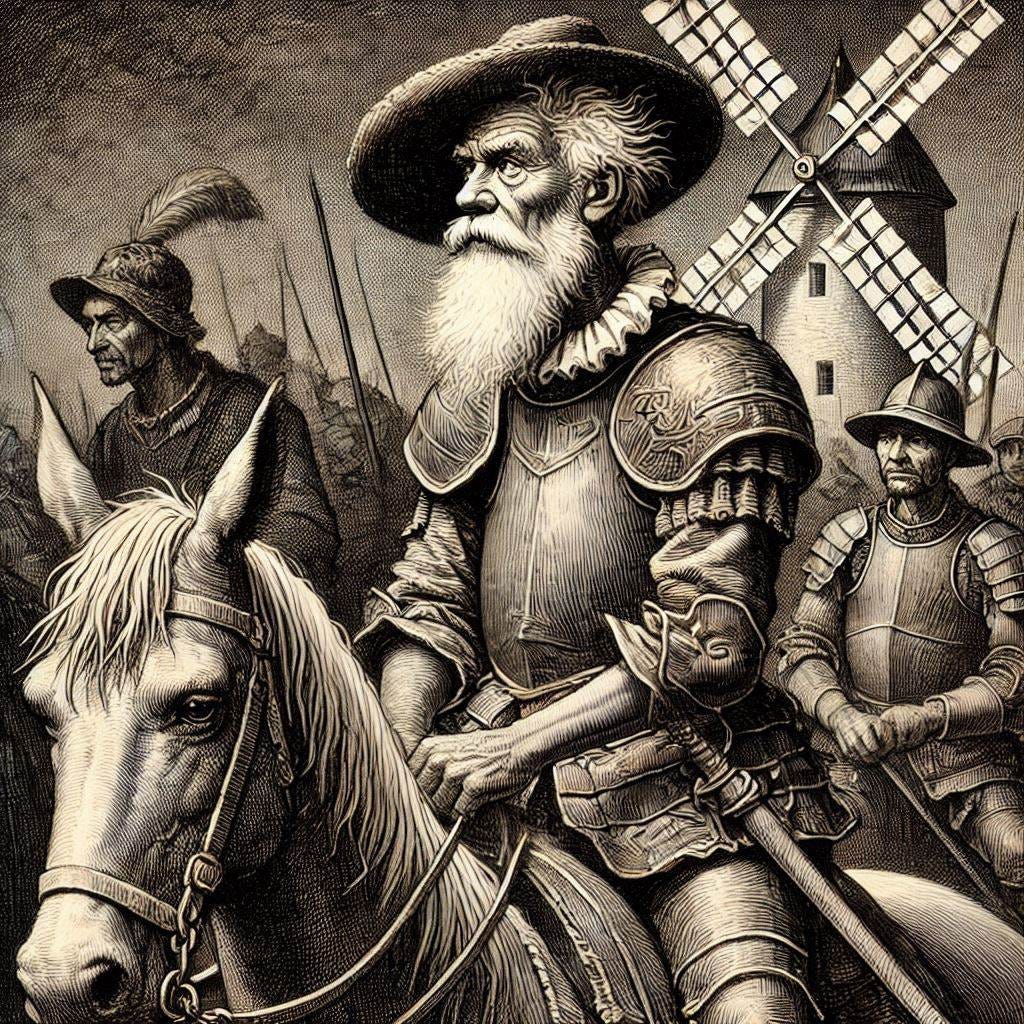The Mysteries of History (January 16 Edition)
Don Quixote, Prohibition, and the Persian Gulf War
George Santayana: “Those who cannot remember the past are condemned to repeat it.”
Carlos Santana: “Everything is a battlefield. If you fight with anger, you are part of the problem. If you fight with joy, you're part of the solution.”
1605 — Don Quixote, The Man of La Mancha
The book that some consider the first modern novel, written by Miguel Cervantes, was published on this date in 1605. That masterwork is the source of the word “quixotic” and the saying “tilting at windmills”; the principal protagonists in the novel, in addition to the delusional Quixote himself, are Quixote’s muse Dulcinea (“Sweetie Pie”), his reluctant partner Sancho Panza along with his donkey Dapple, and Quixote’s horse Rocinante (which is the name John Steinbeck gave the vehicle he drove while traversing the United States in order to write the 1962 travelogue Travels With Charley: In Search of America).
Questions: What was Don Quixote's "real" name (Don Quixote was a nom de guerre the protagonist gave himself)? What was the message or motive behind Cervantes' novel? Why and when was Cervantes held captive, and how did he escape? What other highly-regarded novels were heavily influenced by this one? Which Canadian artist wrote and performed a song entitled "Don Quixote"?1919 — Prohibition
A poster child from the “didn’t think it through” department, ill-conceived and ill-fated Prohibition (making the “manufacture, sale, or transportation of intoxicating liquors for beverage purposes” illegal) came into effect when the 18th amendment to the Constitution was ratified on this date in 1919. The “Roaring 20s” ensued. Impossible to enforce without the wholehearted support of the police or resorting to extremely draconian measures to do so, the illogical ban was doomed to failure. After all, if you’re going to criminalize an activity that in some instances causes a lot of harm, shouldn’t sex be the first target? Yet scarcely anyone would consider that practical, possible, or desirable (see George Orwell’s 1984), so why enact unenforceable laws? It only leads to lawlessness, which can then spill over into other crimes being committed once committing “crimes” becomes habitual and normalized. Prohibition brought about speakeasys, bootleggers, and fostered organized crime; it died a much-deserved death in 1933 with the passing of the 23rd Constitutional amendment, which reversed the 18th amendment, repealing Prohibition. Carrie Nation wasn’t around to see any of it; she died in 1911.
Questions: How long did it take from when Congress passed the 18th amendment until Prohibition actually went into effect? Did any other nations of the earth follow the lead of the United States in criminalizing the drinking of alcohol? How many nations had already done so prior to the U.S.? Who was Carrie Nation?1991 — Persian Gulf War Begins
public domain photo from wikimedia commons
After Iraq refused to retreat from Kuwait, which it had invaded and occupied five months previously, Operation Desert Storm began with bombing the living nightlights out of Baghdad. Thirty-two nations were involved in the conflict against Iraq, including European and Arab countries.
Questions: How long did it take before Iraq surrendered? Why did Iraq respond to the attack by firing missiles at Israel and Saudi Arabia? Why did Israel not respond to those attacks? Did the U.S. ever fight another war with Iraq?








I’ve often read about the great significance of this novel in the literary tradition of Western culture. I’ve attempted to read it at least three times, but I’ve always failed to get past page 100. His prose is so lengthy and intricate that it becomes overwhelming. One day…